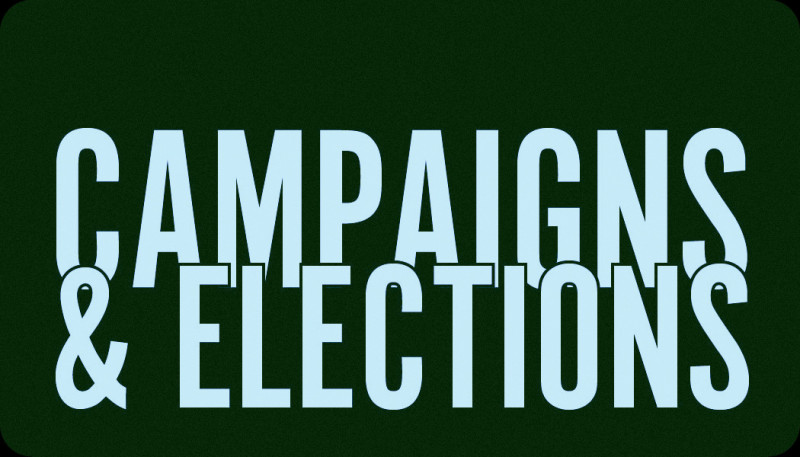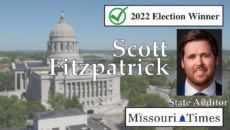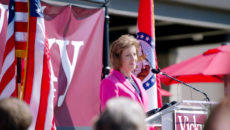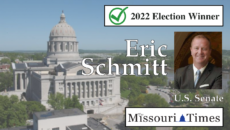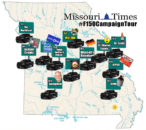Nonpartisan research firm Gravis Marketing did a random hybrid survey of 931 registered voters in Missouri from March 5-7. The margin of error was ±3.2.
Gravis used interactive voice responses and an online panel of cell phone users, weighted by demographics. The poll was paid for by Gravis Marketing.
The poll assessed statewide performance and approval, including the scandal-plagued Gov. Eric Greitens, who has an approval rating of 34 percent. 36 percent of those polled strongly disapproved of his performance, with another 14 percent somewhat disapproving, leaving only 15 percent uncertain and 50 percent total disapproving of the Governor’s performance. Greitens has the highest disapproval rate of all statewides.
If held today, 42 percent of those polled said they would vote Republican, with 40 percent saying they would vote Democrat, leaving 18 percent uncertain. The same numbers were reflected in a U.S. Senate election poll pitting U.S. Sen. Claire McCaskill against Attorney General Josh Hawley, 43 percent-40 percent-18 percent.
In 2018, Democrats are defending 10 Senate seats in states that were won by Donald Trump in 2016. One of those seats consistently regarded as one of the most vulnerable is McCaskill.
“This is a state that was a purple state in 2000, but has become quite red over the past 18 years,” Gravis Marketing Managing Partner Doug Kaplan noted. “This will be a very close race. The Senate might hinge on this race.”
Democrats need to net two seats to win the Senate. With options limited to Nevada, Arizona, and Tennessee with more outside chances in Mississippi and Texas, Democrats will need to minimize loses among Trump state incumbents like Clare McCaskill, according to Kaplan. Trump won Missouri by 18.5 percent in 2016.
Kaplan points out that despite McCaskill’s slight edge today, “there are certainly numbers that she should be concerned about.”
Voters give McCaskill a lackluster 42 percent – 43 percent job approval spread while her opponent has a 37 percent – 34 percent approval rating. While Hawley’s numbers are not stellar, he has more room to grow. While only 14 percent of voters are uncertain about McCaskill, 29 percent say the same about Hawley. Roy Blunt narrowly won a 2.79 percent plurality in 2016 to win a second term while Donald Trump was trouncing Clinton in the state. Blunt holds a 33 percent – 48 percent approval rating, which is constant with how far he underperformed Trump in 2016.
One possible red flag for Hawley is the makeup of the undecided voters in the poll. While only 14 percent of Republicans are undecided at this point, 23 percent of Democrats are currently undecided. McCaskill holds a 47 percent – 37 percent edge among independents in the poll with 17 percent undecided. The age of the undecided voter is also lower than the decided voter. 30 percent of 18-29 and 25 percent of 30-44 year-olds are undecided compared to only 8 percent of 55-64 years old and 6 percent of those 65 or older. There are also more female undecided voters (23 percent) than male undecided voters (13 percent).
The race for state Auditor was also tested among voters. In the race for auditor, incumbent Democrat Nicole Galloway polled at 36 percent compared to Rep. Paul Curtman, who pulled 34 percent, with 29 percent uncertain.
Donald Trump’s approval rating has taken a hit in Missouri, but he still remains more popular than recently indicted Governor Eric Greitens. Trump holds a 46 percent – 50 percent approval spread, while Greitens is at 34 percent – 50 percent. Multiple Republican members of the Missouri legislature have called on Greitens to resign.
The Conservative lean of the state is highlighted in the questions Gravis asked voters about various issues. Voters approve of the Tax Reform law 37 percent – 35 percent and say they would be more likely to support a candidate that supported the bill by a 36 percent – 29 percent margin. Voters are split over whether there should be a full ban on the ability to obtain an abortion in Missouri 42 percent – 42 percent. The President’s immigration reform plans are also above water among voters by a 47 percent – 42 percent margin.
The bipartisan support for increased gun control was something that may have shifted recently after the recent Parkland School Shooting in Florida. 84 percent – 11 percent support universal background checks, 70 percent – 24 percent support raising the minimum age to purchase a firearm to 21 and 49 percent – 40 percent support a ban on all semi-automatic weapons.
Rachael Herndon was the editor at The Missouri Times and also produced This Week in Missouri Politics, published Missouri Times Magazine, and co-hosted the #MoLeg podcast. She joined The Missouri Times in 2014, returning to political reporting after working as a campaign and legislative staffer.
Rachael studied at the University of Missouri – Columbia. She lives in Jefferson City with her husband, Brandon, and their two children.

